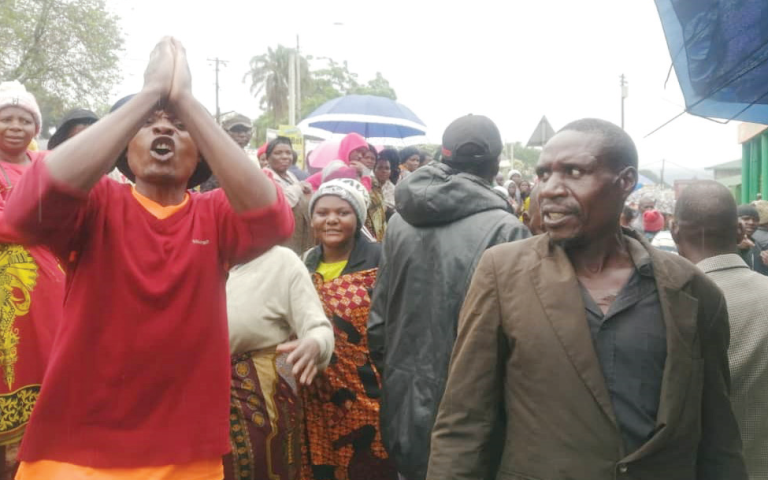Despite paying in advance for the Affordable Inputs Programme (AIP) fertiliser and transportation costs in November 2022, some beneficiaries are yet to access the inputs or have their money refunded, Nation on Sunday has established.
The development, which comes hot on the heels of Leader of Opposition Kondwani Nankhumwa calls for government to refund farmers’ money, has created frustration and panic among the beneficiaries, especially in parts of the Southern Region whose maize crop is tasselling.
AIP beneficiaries waiting to access inputs
The advance payment for fertiliser to agents, according to farmers we have spoken to, was to ensure a smooth process than challenges previously faced in redeeming the commodity.
Random checks Nation on Sunday conducted on Wednesday established that beneficiaries received only NPK fertiliser.
But while we could not verify the exact number of beneficiaries affected by the arrangement, the K35 000 paid was for two bags of fertiliser and transport.
Nation on Sunday was able to verify, through cooperatives and farmers clubs, that such cases are prevalent in Thyolo, Mulanje, Zomba, Chiradzulu, parts of Blantyre Rural, Machinga, Ntcheu, Ntchisi, Rumphi and Kasungu.
In a telephone interview on Wednesday, Ufulu Cooperative chairperson Joseph Mazingati from Traditional Authority Kunthembwe in Blantyre rural said beneficiaries are panicking.
He said: “They are confused since they anticipated that by now they would have received the fertiliser and seed. So, as it is, they remain stranded.”
Mazingati said if they will not have the fertiliser by Monday beneficiaries will take to task the Ministry of Agriculture through the district council.
In a separate interview, Mary Wokomani of Chilungamo Farmers Club in Machinga said this will likely affect prospects of a good harvest.
“When we were making the payments we were told that we would easily access the fertiliser. We were told that we would not have to spend long hours in queues to redeem the inputs. But this is worrying that we have received nothing since November,” she said.
While both Mazingati and Wokomani indicated that beneficiaries did not receive any bag, the situation is different in Rumphi where beneficiaries received only NPK fertiliser.
For instance, beneficiaries in the area of Traditional Authority Katumbi, were told that they would receive the second bag of fertiliser by the end of December.
They received the first bag a week after making the payments in the third week of November 2022.
Pamodzi Cooperative chairperson Margaret Mzumara expressed frustrations at the situation.
She said: “We are, however, hopeful that maybe the Urea fertiliser will be delivered by next week. Otherwise, at present, we are all anxious because other beneficiaries that were able to access both bags of NPK and Urea are progressing with their maize.”
In Chiradzulu, Nation on Sunday found disgruntled beneficiaries mobilising themselves to march to the District Commissioner’s offices.
A beneficiary, Jonathan Nankwawa said they have, however, decided to engage their legislator to intervene in the situation.
On Monday, opposition members of Parliament stormed the Smallholder Fertiliser Revolving Fund of Malawi headquarters to protest delays in delivery of fertiliser to their respective constituencies.
Ministry of Agriculture figures show that as of January 2023, 168 324 metric tonnes (MT) of fertiliser were supplied against a 247 384MT demand.
Meanwhile, the Farmers Union of Malawi (FUM) and agriculture policy experts have described the farmers’ predicament as unfortunate.
FUM chief executive officer Jacob Nyirongo said in an interview on Wednesday government needed to prioritise such beneficiaries in its fertiliser distribution plan.
He said: “This threatens the livelihoods and security of the affected farmers. We call on government to confirm if this practice is part of the official procedures in AIP delivery and to ensure that farmers that have been affected are promptly supported.”
Lilongwe University of Agriculture and Natural Resources agriculture economist Horace Phiri said though the official number of beneficiaries affected is not known, he pointed out that this will negatively impact them as their money is locked; hence, they cannot access fertiliser from commercial sources.
He said this will further affect this year yield, resulting in households facing hunger.
“Also, the investment we made in the programme this year will also be put to waste. An opportunity lost where yet another potent policy tool is not achieving results due to poor management,” said Phiri.
In the current 2022/23 National Budget, government allocated K109.4 billion. But this money was not enough to cover all the targeted beneficiaries.
As a result, some donations were made to support the country with 92 000 metric tonnes of fertiliser.
Agricultural policy expert Tamani Nkhono Mvula in a separate interview questioned the rationale used in collecting money in advance from beneficiaries.
He also stressed that at this point when maize has started tasseling, any fertiliser that can be applied would be ineffective.
Nkhono Mvula said: “Once the maize reaches that stage, application of fertiliser in most cases does not become effective as it could have been if applied earlier.”
On January 19 2023, the Leader of Opposition in Parliament threatened to seek other alternatives to address the matter if government would not pay back the money collected from the beneficiaries.
He said: “I will have no choice other than seeking guidance on the way forward from legal and governance institutions, including the Malawi Law Society, Malawi Human Rights Commission (MHRC), Malawi Legal Aid Bureau and Office of the Ombudsman, among others.”
Nankhumwa has indeed lived up to his word by writing the MHRC to investigate the alleged abuse of beneficiaries through such an arrangement.
But Nation on Sunday’s efforts to seek comments from Minister of Agriculture Sam Kawale proved futile as he did not respond to our questionnaire despite acknowledging receipt.
The post Farmers feel duped first appeared on The Nation Online.
The post Farmers feel duped appeared first on The Nation Online.
 Moni Malawi
Moni Malawi 
